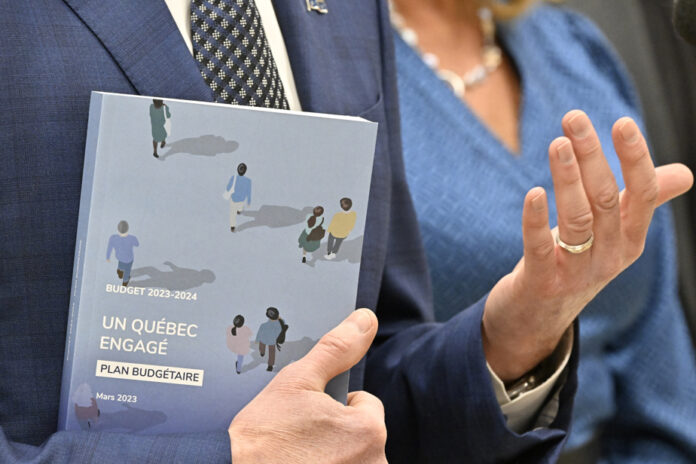Thing promised, thing due: Quebec lowers taxes, which will allow a person living alone to save up to $814 this year, and up to $1,627 for a couple. Here are six things to know about this first budget of the second term of the Coalition avenir Québec (CAQ), again written in red ink. The return to a balanced budget is maintained for 2027-2028.
The Legault government lowers the first two tax rates by 1 percentage point. The Minister of Finance, Eric Girard, thus renounces to collect 9.2 billion dollars by 2027-2028.
This tax cut is financed by lower-than-expected payments to the Generations Fund. The big moneymaker justifies it because of the shortage of labor and the economic slowdown. At “no time or in any way” will this lowering of the tax burden “will be at the expense of public services”, promises Mr. Girard.
Budget 2023-2024 provides for total investments of more than $24 billion over five years. The deficit should be 4 billion in 2023-2024.
What do you think of this budget from Minister Eric Girard?
The growth in health expenditure amounts to 7.7%. The government is adding 5.6 billion over five years to Minister Christian Dubé’s “Health Plan”. Of this amount, 2.2 billion will be used to sustain the vaccination and screening centers created during the pandemic and to integrate other front-line services.
Quebec is also spending $60 million to create Santé Quebec, whose mandate will be to improve the efficiency of the network. An envelope of 146 million will be used to develop the “Votre santé” appointment booking platform, inspired by “Clic santé”.
In terms of access to mental health care, the government is investing $565 million over five years.
Children’s reading and writing skills have declined due to the pandemic. The government is therefore injecting $449 million over five years to improve these skills at the elementary and secondary levels and $200 million over five years to modernize vocational training.
Budget 2023-2024 provides for spending growth of up to 6% in education. Quebec sets the goal that “all students who attend [a public secondary school] have access” to a specific educational project, such as a school concentration in the arts, sciences or sports. An envelope of 168 million over five years is granted to achieve this target.
Amendments to the Quebec Pension Plan (QPP) aim to “raise the maximum age for applying for a retirement pension from 70 to 72 and make contributions to the [plan] optional from age 65”.
In addition, as of next January 1, Quebec will allow citizens aged 65 and over who receive a retirement pension to stop paying QPP contributions in order to keep them employed, in the context of the labor shortage. work.
In this regard, $615 million over six years is planned to improve the socio-economic integration of newcomers, to better regionalize them, to recognize their skills acquired abroad and to deploy Francisation Québec.
Finance Minister Eric Girard still predicts the odds of a recession at 50%. His budget, however, makes a double point that “Quebec is not in a recession.”
For several months, inflation and rising interest rates have held back economic growth. The Ministère des Finances predicts that the Quebec economy will grow in 2023 by 0.6%, which is higher than what private sector forecasters expect at 0.3%.
“The year 2023 will be a period of transition” and “real GDP growth is expected to be 1.4% in 2024”, it is expected.
While the government promises an action plan by the fall to reverse the decline of French, Minister Girard’s budget provides $88 million over five years to implement the recent Bill 96, which modernizes the Language Charter French (52.9 million). Quebec is also investing to create a table of indicators on the linguistic situation in Quebec (27.5 million) and to implement a national campaign to defend, promote and enhance French (7.5 million).
In culture, Eric Girard grants 101 million over five years to Télé-Québec to increase its offer in youth programming.















